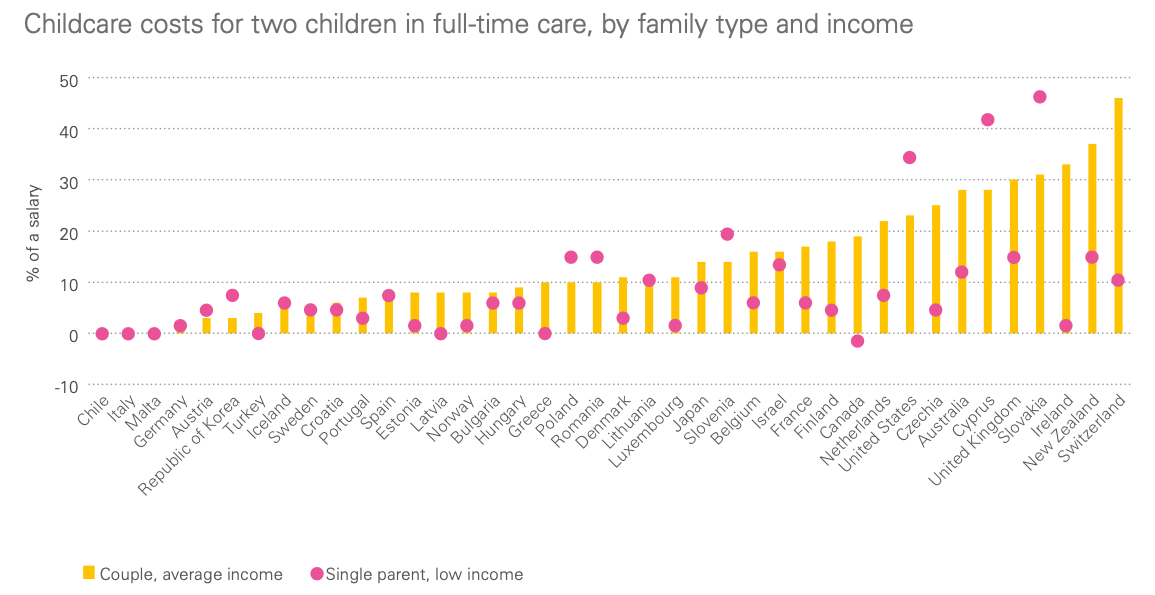Childcare Costs in Switzerland – Why They Are Among the Highest in the World
When parents in Switzerland think about childcare, costs are often the decisive factor. Nurseries usually operate in half- or full-day units, with minimum commitments that quickly add up. Fees between 100 and 150 CHF per day are common in private childcare centres, meaning that full-time care for one child can easily reach 2,500 to 3,000 CHF per month. Even though subsidies exist in some municipalities, availability is limited and sibling discounts are usually minimal.
A European Outlier
Compared with neighbouring countries, Switzerland stands out as one of the most expensive childcare systems worldwide. According to OECD figures, families with two children in full-time nursery care spend on average close to 30 percent of their household income, net of subsidies, on childcare alone. By contrast, parents in Germany or Italy face little or no net costs because public funding covers most of the expenses (euronews.com). This disparity is striking: while German families may pay only a few hundred euros per year, Swiss families face annual costs exceeding 60,000 CHF for two children in private nurseries.
Consequences for Families and Policy
These high costs shape everyday life. Many mothers reduce working hours or leave the workforce because a second income is largely absorbed by nursery fees. A couple years ago UNICEF has ranked Switzerland poorly not only for affordability but also for parental leave policies, which are short by international standards. For families, the financial burden adds to the already high cost of living: estimates suggest raising two children in Switzerland costs at least half a million francs, even without counting full-time childcare.
The political debate has therefore intensified. The federal government’s earlier stimulus programme, which provided CHF 100 million to promote childcare, runs until 2026 and will then expire (bsv.admin.ch, parlament.ch). In spring 2025, the National Council approved a new childcare allowance: parents of children up to eight years of age attending a nursery or after-school care facility will receive at least CHF 100 per child per month, plus CHF 50 for each additional half-day of attendance. For children with special needs, the allowance will be increased by 1.5 to 3 times. At the same time, a federal contribution of CHF 200 million over four years was adopted to help cantons expand childcare capacity. This shifts responsibility more strongly to cantons and employers, while the role of the federal government remains limited (swissinfo.ch, lenews.ch).
The reality is that nurseries and childcare centres in Switzerland remain both high-quality and extremely costly. Parents must therefore plan carefully, ask early about subsidies in their municipality, and weigh professional choices against the real costs of care. For policymakers, the challenge is equally clear: without further reform, Switzerland risks remaining one of the least family-friendly countries in Europe when it comes to childcare affordability.
How we can support you
For many international families, navigating childcare options in Switzerland can be overwhelming. Questions about costs, waiting lists, subsidies, or the balance between public and private nurseries are not always easy to answer, especially when every canton and municipality applies its own rules.
At Ulrich Educational Consulting, we guide families through this complexity. We help identify suitable childcare centres, explain the cost structures, clarify where subsidies may apply, and show how these choices fit into the broader financial and educational planning for the family.
Our goal is to give parents peace of mind by ensuring that both the quality of care and the financial implications are transparent from the very beginning.
For more information on how we can support your family, visit our website or contact us directly to schedule a consultation.
Let Ulrich Educational Consulting be your partner in educational and financial success.
Did You Know?
Instead of saving on nursery fees, some households in Switzerland prefer to maintain two incomes and invest part of the additional earnings into education savings accounts or long-term funds for their children. By doing so, the higher childcare costs are partly offset by capital growth over time. Tools like a structured Plan Workshop at ZWEI Wealth can help families model these scenarios, compare different saving strategies, and integrate childcare expenses into a broader financial and educational plan.
Contact us at Ulrich Educational Consulting!


